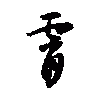
Gan, Gan, and Gan
By navaburo,
I have had trouble with the trio of traditional characters which simplify to 干. It turns out (as usual) that all three have curious and twisted etymologies. Here are some mnemonics for keeping the traditional characters 幹干and 乾 straight in your head:
乾gan1
This is the most straight-forward of the trio.
It means "dry":
乾果
dried fruit
乾淨
clean
In its qian2 pronunciation, it is also one of the Eight Trigrams, and a surname, but those are much lower frequency uses.
Mnemonic: When there is a drought you beg for even a little mist.
Etymological note:
Wieger clarifies that "dry" was originally written using 旱 on the left (with 十 above it?). The character 乾 originally was read qian2 and represented the sun shining into the jungle, dislodging vapors which then rise up into the sky.
幹gan4
This character can mean "to do" or "tree trunk".
It can be used alone:
你幹了一件蠢事。
You have committed ("done") a folly.
Or in the common idiom gan4ma5:
你幹嘛/ 你幹甚麼?
What are you doing?
A canonical example of the "tree trunk" meaning is:
樹幹
shu1gan4
tree trunk
Mnemonic:
A tree (which originally was made of wood but is now a post-modern clothes hanger pole) is topped with an umbrella of leaves. But, through the mist, you can only see the trunk.
Etymonlogical note:
Wieger says the 干 component in 幹 is supposed to be 木, the former being an "absurd phonetic redundancy" This would make more sense.
干gan1
This is the odd-ball in the group. It has several meanings. Its most prolific meaning is "to offend":
干犯
gan1fan4
to offend or to violate
干涉
gan1she4
to meddle
But this gan can also mean "stem" in:
天干
the Ten Heavenly Stems
An archaic meaning is "shield":
干戈
gan1ge1
weapons of war, literally "shield and spear"
Mnemonic:
In Toronto, up until a couple of years ago, it was illegal to hang clothes outside, i.e. one of the biggest offenses and ways to offend the sensibilities of people was to hang your clothes outdoors. Silly, but unfortunately true. (credit: koohii user vorpal)
Etymological note:
Wieger tells us that 干 represents a pestle. By extension it means to grind or destroy. Destruction in the moral sense gives offense. Destruction in the martial sense gives the warlike association in 干戈.
- Read more...
- 8 comments
- 6986 views
